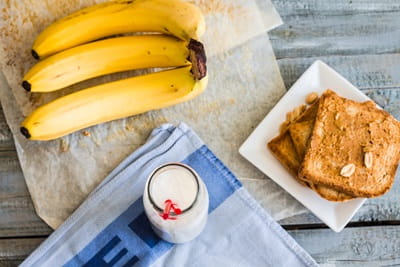Breastfeeding on a Balanced Diet

Just like it was important to eat the right foods when you were pregnant, it’s just as important now that you’re breastfeeding. Breast milk contains most of the nutrients that your baby needs for the first six months. You also probably need some extra get-up-and-go these days, and healthy eating will help keep you energized. It also may help you get rid of some of your pregnancy weight a little faster.
More, More, More
You need more calories and nutrients when you‘re breastfeeding, and if you’re not getting enough it can have a negative effect on your breast milk. To keep up your energy and get some extra calories, try healthy options like a slice of whole-grain bread with a tablespoon of peanut butter, a medium banana or apple, or 8 ounces of yogurt. Try to avoid processed foods; they’re high in added sugars and unhealthy fats.
Foods and Fluids
Protein-rich foods like lean meat, eggs, dairy, beans, lentils and seafood low in mercury will help fuel your milk production. Exposure to excessive amounts of mercury through breast milk can pose a risk to a baby's developing nervous system, so be sure to research acceptable seafood choices. Whole grains, fruits and veggies are all good; be sure to wash fruits and vegetables to reduce exposure to pesticide residue. Drink frequently, preferably before you feel thirsty, and have a glass of water handy when you’re breastfeeding. But keep an eye on juices and sugary drinks. Too much sugar can sabotage your weight-loss efforts.
Vitamins or Supplements
Your doctor might recommend that you continue to take a daily prenatal vitamin or a multivitamin while you’re breastfeeding. Other important supplements may include B-12 (essential for baby's brain development), vitamin D (baby needs vitamin D to absorb calcium and phosphorus) and omega-3 (an important component of the central nervous system, skin and eyes, as well as healthy brain function).
While there aren’t many “don’ts,” there are a couple of things to avoid or limit, including alcohol and caffeine.
- Alcohol makes its way into breast milk, and there’s no level of alcohol that’s safe for a baby. If you drink, avoid breastfeeding until all alcohol has cleared your breast milk. This can take two to three hours, depending on what you drink and your body weight. (By the way, “pumping and dumping” doesn't speed up getting the alcohol out of your body, so don’t think that you can pump and then breastfeed safely.
- Caffeine in your breast milk might interfere with your baby’s sleep or cause them to be agitated. About 1 percent of the caffeine you drink is transferred to your breast milk. Moderate amounts of caffeinated drinks haven’t been found to be harmful, but try to limit your intake to 16-24 ounces a day. Too much caffeine can also affect your sleep, and you need to be awake and energized to care for that squirmy little bundle of joy!
For the most part, you can eat anything in moderation while you’re breastfeeding. But keep in mind: some flavors from what you eat and drink might be reflected in your breast milk. If you notice that your baby is cranky or gets sick soon after feeding, take notice of what you ate or drank, as that could be the culprit. Don’t make any major changes to your diet without clearing it with your doctor first. Make good food choices, and breastfeeding your baby will be a piece of (healthy) cake!
Research shows that easily accessible help from a knowledgeable, caring breastfeeding professional is a key factor in helping mothers meet their personal goals. Consider scheduling a lactation consultation by calling (813) 872-3932.




